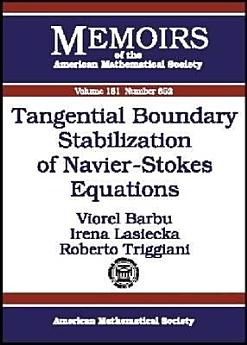Tangential Boundary Stabilization of Navier-Stokes Equations: Volume 181, Issue 852
Viorel Barbu · Irena Lasiecka · Roberto Triggiani
2006. jan. · American Mathematical Soc.
E-könyv
128
Oldalak száma
reportAz értékelések és vélemények nincsenek ellenőrizve További információ
Információk az e-könyvről
The steady-state solutions to Navier-Stokes equations on a bounded domain $\Omega \subset Rd$, $d = 2,3$, are locally exponentially stabilizable by a boundary closed-loop feedback controller, acting tangentially on the boundary $\partial \Omega$, in the Dirichlet boundary conditions. The greatest challenge arises from a combination between the control as acting on the boundary and the dimensionality $d=3$. If $d=3$, the non-linearity imposes and dictates the requirement thatstabilization must occur in the space $(H{\tfrac{3 {2 +\epsilon (\Omega))3$, $\epsilon > 0$, a high topological level. A first implication thereof is that, due to compatibility conditions that now come into play, for $d=3$, the boundary feedback stabilizing controller must be infinite dimensional. Moreover,it generally acts on the entire boundary $\partial \Omega$. Instead, for $d=2$, where the topological level for stabilization is $(H{\tfrac{3 {2 -\epsilon (\Omega))2$, the boundary feedback stabilizing controller can be In order to inject dissipation as to force local exponential stabilization of the steady-state solutions, an Optimal Control Problem (OCP) with a quadratic cost functional over an infinite time-horizon is introduced for the linearized N-S equations. As a result, the sameRiccati-based, optimal boundary feedback controller which is obtained in the linearized OCP is then selected and implemented also on the full N-S system. For $d=3$, the OCP falls definitely outside the boundaries of established optimal control theory for parabolic systems with boundary controls, in that thecombined index of unboundedness--between the unboundedness of the boundary control operator and the unboundedness of the penalization or observation operator--is strictly larger than $\tfrac{3 {2 $, as expressed in terms of fractional powers of the free-dynamics operator. In contrast, established (and rich) optimal control theory [L-T.2] of boundary control parabolic problems and corresponding algebraic Riccati theory requires a
E-könyv értékelése
Mondd el a véleményedet.
Olvasási információk
Okostelefonok és táblagépek
Telepítsd a Google Play Könyvek alkalmazást Android- vagy iPad/iPhone eszközre. Az alkalmazás automatikusan szinkronizálódik a fiókoddal, így bárhol olvashatsz online és offline állapotban is.
Laptopok és számítógépek
A Google Playen vásárolt hangoskönyveidet a számítógép böngészőjében is meghallgathatod.
E-olvasók és más eszközök
E-tinta alapú eszközökön (például Kobo e-könyv-olvasón) való olvasáshoz le kell tölteni egy fájlt, és átvinni azt a készülékre. A Súgó részletes utasításait követve lehet átvinni a fájlokat a támogatott e-könyv-olvasókra.




